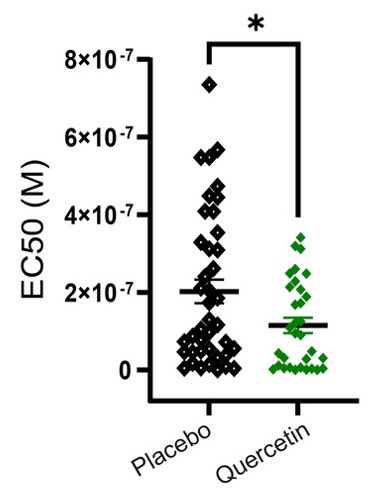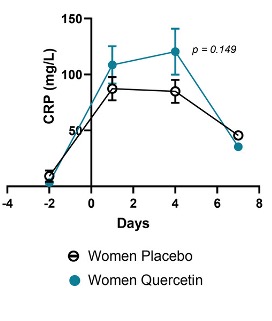Key Points:
- Quercetin reduces the risk of abnormal heart rhythms (atrial fibrillation) in heart disease patients.
- Quercetin prevents blood vessel dysfunction in men with heart disease.
- Quercetin prevents increases in pro-inflammatory and senescent cell genes in men with heart disease.
In a recent clinical trial, Canadian scientists investigated the effect of a compound called quercetin on heart disease patients. Found in many fruits and vegetables like onions, apples, and berries, quercetin is known for its anti-oxidant and anti-inflammatory properties. With quercetin supplementation, the Canadian researchers sought to target senescent cells, one of the purported biological drivers of aging. The results were both exciting and perplexing.
Quercetin Reduces the Risk of Abnormal Heart Rhythms
The study focused on patients undergoing coronary artery bypass surgery, a major procedure to restore blood flow to the heart. One of the most common complications after this surgery is a heart rhythm disorder called atrial fibrillation (AF), which can lead to serious issues like stroke.
In a randomized, double-blind trial, 97 patients were given either 500 mg of quercetin or a placebo twice daily. The intervention began two days before surgery and was taken for eight days following surgery, upon leaving the hospital.
The most striking finding was that quercetin dramatically reduced the risk of developing post-operative AF. Only 4% of patients who took quercetin developed the complication after a 30-day follow-up, compared to a much higher 18% in the placebo group. This is a statistically significant reduction, suggesting that a simple, inexpensive supplement could prevent a serious surgical complication.

Quercetin Prevents Blood Vessel Dysfunction in Males
Our arteries dilate to accommodate higher volumes of blood, but cannot do so efficiently if stiff. This is why artery stiffness is associated with heart disease-related events, like heart attacks and mortality. The more readily our arteries dilate, the less stiff and more functionally healthy they are considered to be.
To assess dilation, the researchers examined tiny segments of arteries collected from the patients during surgery. In the lab, they exposed the artery segments to different concentrations of a chemical that triggers dilation called acetylcholine. They found that the artery segments collected from the quercetin group required less acetylcholine to induce dilation, suggesting they dilate more readily, are less stiff, and are more functionally healthy.

However, as the researchers dug deeper, they found a clear divide based on sex. By separating the data from male and female participants, they found that artery dilation was only improved in the male members of the quercetin group. These results suggest that quercetin counteracts blood vessel dysfunction in heart disease patients, but only for males.
Quercetin Reduces Inflammation in Males
Using advanced techniques like proteomics (the study of proteins) and single-nucleus RNA sequencing (which maps gene activity in individual cells), the researchers painted a more detailed picture of what was happening inside the patients’ blood vessels.
Compared to the placebo group, the vascular cells of male patients showed lower levels of gene activity related to both senescent cells and inflammation. Moreover, a protein marker of systemic inflammation, C-reactive protein (CRP), showed a trend towards reduction upon hospital discharge. However, in women, quercetin not only failed to provide benefits, but it appeared to trigger the very processes it was meant to stop, increasing CRP levels.

What Accounts for Quercetin’s Sex-Dependent Effects?
The benefits of quercetin were seen almost exclusively in male patients. In men, the supplement not only reduced AF but also improved the health and function of their blood vessels and lowered key markers of inflammation and senescent cells. So, what explains this stark difference? The researchers believe it comes down to the baseline health of the patients’ cells.
Male vascular cells showed significantly more signs of aging and inflammation to begin with, while female vascular cells were healthier at the start. The researchers theorized that, in females, quercetin interfered with the body’s natural, transient defense and repair mechanisms. In males, however, these healing mechanisms had already failed, leading to the accumulation of senescent cells and chronic inflammation.

Quercetin: A Senolytic
The study explored one of the most cutting-edge aspects of the aging biology field known as cellular senescence. This is a natural process where our cells, after encountering stressors (e.g., ultraviolet radiation, DNA damage), stop dividing. Instead of dying, they enter a senescent state, pumping out inflammatory molecules that damage organs and tissues. In our arteries, senescent cells contribute to the artery stiffening and inflammation that promote heart disease.
Senolytics are compounds that can selectively find and eliminate senescent cells, which tend to accumulate with aging in organs and tissues throughout the body. Quercetin is one of the most well-studied natural senolytics, usually combined with the anti-cancer drug dasatinib. The Canadian researchers’ study supports quercetin’s senolytic effects in men with heart disease, but it appears more studies are needed to determine the risk of taking quercetin for women.
This research is a reminder that “one size fits all” does not apply to medicine. The biological differences between men and women can lead to vastly different responses to the same treatment. While these findings need to be confirmed in larger studies, they open up a fascinating new avenue for personalized medicine in heart disease—one where treatments could be tailored not just to the condition, but also to the sex of the patient.